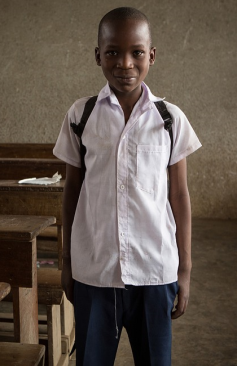Beyond Progressive Realization
By Joseph Kaifala
Published on November 4, 2013

The importance of education to nation-building has been known since time immemorial, but in many African countries, this is still a novel idea to be sold and bought by leaders who remain unmoved by all statistics signaling positive correlations between education and development. In real terms, the difference between the West and Africa is not in wealth or natural resources, but the inadequacy of human resources due to the limited education in many African countries.
Evidence suggests that the greatest countries have always been those that make bold investments in education and learning. In September 2000, moving beyond a decade of conferences and summits, world leaders adopted the Millennium Declaration and committed themselves to a new global leadership to reduce extreme poverty by 2015.
The ensuing Millennium Development Goals (MDGs) are categorized into 8 goals (including education), 21 targets and 60 indicators for measuring progress between 1990 and 2015—the end date. But even with significant achievements towards the MDGs in other regions, it is clear that these goals will not be met anywhere in sub-Saharan Africa come 2015. Education, which has positive impacts on many of the other goals, remains appalling in many African countries.
According to the 2012 MDGs Report, 61 million children of primary school age were out of school in 2010. More than half of them, 33 million to be precise, were in sub-Saharan Africa. Relatively 24 percent of children of primary school age in sub-Saharan Africa are still out of school. The same report points out that one-quarter of the children who complete primary school in sub-Saharan Africa do not continue to secondary level. Subsequently, according to the report, 45 million young people between the ages of 15-24 are unable to read and write short and simple phrases about their daily life.
The failure to achieve universal primary education and some fundamental levels of education is in contravention of treaty obligations under the Convention on the Rights of the Child (CRC) and the African Charter on the Rights and Welfare of the Child (Charter). It is also a failure of commitment under the Universal Declaration of Human Rights (UDHR). The CRC is currently the most widely ratified human rights treaty in history. Only two countries, Somalia and the United States, have not yet ratified the document, which means all other African countries can be held accountable under this treaty for failure to provide universal basic education.
Article 28 of the CRC recognizes the right of every child to education and commits states parties to the progressive realization of free and compulsory primary education for all. Article 28(1)(b) encourages the development of different forms of secondary education, and to make them available and accessible to every child by taking appropriate measures such as offering free education and financial assistance. The African Charter also grants similar rights to education. Article 11 of the Charter provides that ;every child shall have the right to an education. The Charter requires states parties to take all appropriate measures towards achieving full realization of the right to education, in particular, the rights under article 11(3) such as free and compulsory basic education, the development of secondary education in different forms, to progressively make it free and accessible to all, and to take special measures in respect of females, gifted, and disadvantaged children, in order to ensure equal access to education for all.
As of November 2013, 47 African countries out of 54 have ratified the Charter and the rest of the countries are party to the CRC. The two treaties, including article 26 of the UDHR, commit all African countries to universal primary education at minimum. While the UDHR is not a binding international law, it is the foundation of modern international human rights law, hence conventionally binding on UN member states. Article 26(1) of the UDHR states that [e]veryone has the right to education. Education shall be free, at least in the elementary and fundamental stages. Elementary education shall be compulsory.
The UDHR is a pledge to universal respect for and observance of human rights and fundamental freedoms everywhere. It has become the core standard for global application of international human rights law and represents the universal recognition that basic rights and fundamental freedoms are inherent to all human beings, inalienable and equally applicable to everyone, and that every one of us is born free and equal in dignity and rights.
Therefore, apart from commitments under the MDGs, many African countries are failing their obligations under both treaty law and international human rights norms pertaining to the right to education. The time for the progressive realization of fundamental rights to basic education is long overdue and all African countries should be required to fulfill their obligations under the CRC, the African Charter, and the Universal Declaration of Human Rights. There is no African country that cannot, in good faith, achieve universal basic education. The only question is whether these countries are prepared to make education second to no other sector within their national planning. To make this possible, states must view education as an investment rather than an expense.
South Africa, for example, has not only constitutionalized the right to education, it has ensured that the right is fully justiciable. In a recent case brought by several human rights groups against the Government of South Africa on behalf of schools in Limpopo province for failure to provide textbooks, the Pretoria High Court declared that the failure by the Limpopo Department of Education and the Department of Basic Education to provide textbooks to schools in Limpopo is a violation of the right to basic education.
Judge Jody Kollapen commenced her ruling by stating that [m]ost societies, ours included, place a high premium on education. Not only is it the means by which individuals are able to fulfill their potential, it also provides in a wider sense the basis for development and upliftment. Accordingly in the context of International Human Rights Law, and increasingly in the context of National Legal Systems, it is not a privilege but a right, creating with it duties and obligations and where the right is violated, activating the need to craft appropriate remedies.
Article 29 of the South African Constitution recognizes the right to basic education, including adult basic education, and to further education, which the state must reasonably make available. Judge Kollapen stated that education is critical in both freeing and unlocking the potential of each person.” According to him, education is not a stand-alone right but a means through which other rights are realized. The role of education as the first step in the pursuit of nation-building is what Nelson Mandela meant when he wrote that [e]ducation is the great engine of personal development. It is through education that the daughter of a peasant can become a doctor, that a son of a mine worker can become head of the mines, that a child of farm workers can become president of a great nation.
One of the major reasons sub-Saharan Africa remains the poorest and most underdeveloped region of the world is the failure to implement the full realization of the right to fundamental education for all.
The extensive correlation between education and development cannot be ignored. For example, the Global Education for review by former British Prime Minister Gordon Brown states that just one additional year of education adds around 10% to a person’s earnings in developing countries. This applies even to the informal sector where evidence suggests that people with education are in a better position to secure employment and higher wages. The Brown review also shows that maternal education is one of the strongest predictors of child survival. According to the review, the mother with some secondary education can significantly reduce the risk of infant mortality in many African countries, because education empowers women to seek healthcare and other preventative solutions. The review concludes that [i]f all of sub-Saharan Africa’s girls made the transition to adulthood having gained some secondary education, it could prevent 1.8 million child deaths annually.
Africa has some of the largest amounts of natural resources in the world that it can use to transform the future of the continent in terms of development, but such transformation cannot be achieved without the highly needed human resources.
When we fail to educate our children, we violate their rights to dignity and security, and we leave our nations at the mercy of world powers who exploit our resources and leave our people in poverty and indignity. Therefore, all Africans must demand a full realization of the right to education for their children; otherwise poverty will remain an unending vicious circle even in the midst of abundant resources. Those resources amount to naught where there is a lack of human capital to innovate and engineer their transformation into products that can ameliorate the standard of living for ordinary people.
The importance of education is no news to those interested in individual advancement and sustainable development. As Mandela has written, [t]his is an era of intense and vicious competition in which the richest rewards are reserved for those who have undergone the most thorough training and who have attained the highest academic qualifications in their respective fields. Africa must apply proactive measures towards the realization of education for all in order to avoid missing another opportunity to achieve development and self-reliance. Mandela adds that the issues that agitate humanity today call for trained minds and those who are deficient in this regard are crippled because they lack the tools necessary to serve their country.
The Author

Joseph Kaifala is founder of the Jeneba Project Inc. and co-founder of the Sierra Leone Memory Project. He was born in Sierra Leone and spent his early childhood in Liberia and Guinea. He later moved to Norway where he studied for the International Baccalaureate (IB) at the Red Cross Nordic United World College before enrolling at Skidmore College in upstate New York. Joseph was an International Affairs & French Major, with a minor in Law & Society.
He holds a Master’s degree in International Relations from the Maxwell School at Syracuse University, a Diploma in Intercultural Encounters from the Helsinki Summer School, and a Certificate in Professional French administered by the French Chamber of Commerce.
Joseph was an Applied Human Rights Fellow at Vermont Law School, where he completed his JD and Certificate in International & Comparative Law. He is recipient of the Vermont Law School (SBA) Student Pro Bono Award, Skidmore College Palamountain Prose Award and Skidmore College Thoroughbred Award.
Joseph was a 2013 American Society of International Law Helton fellow. He served as Justice of the Arthur Chapter (Vermont Law School) of Phi Alpha Delta Law Fraternity International. He is a member of the Washington DC Bar.
Article picture: JhonDL via Pixabay


